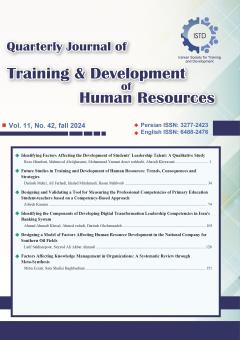Future Studies in Training and Development of Human Resources: Trends, Consequences and Strategies
Subject Areas : روش های نوین آموزش وتوسعه منابع انسانیDarush Mehri 1 , ALI FARHADI 2 , خالد میر احمدی 3 , Hassan mahjoub 4
1 - Assistant Professor, Faculty Member, Shahid Sattari University of Aeronautical Sciences and Technology, Tehran, Iran
2 - Associate Professor, Faculty Member, Shahid Sattari University of Aeronautical Sciences and Technology, Tehran, Iran
3 - PhD student in Educational Management, Faculty of Educational Sciences and Psychology, Shahid Beheshti University, Tehran, Iran
4 - Associate Professor, Faculty Member, Shahid Sattari University of Aeronautical Sciences and Technology, Tehran, Iran
Keywords: Future Studies, Training and Development, Future Studies of Training, Training and Development Trends ,
Abstract :
This research aims to identify and explain effective trends in Training and development. The present research is a qualitative future study that draws from systematic review methods and environmental scanning. The research community consists of all digital documents, educational websites, expert and professional ones related to education and development from 2015 to 2024 on World Wide Web with specific keywords added up to 96 documents. Finally, 26 documents were analyzed based on Sandelowski & Barroso’s method In addition, six key informants elected purposefully on a criteria basis were invited for focus meetings to identify the consequences and strategies. Mayring’s qualitative content analysis was used to analyze the data. Four criteria, i.e. credit, transferability, dependability and verifiability were utilized to check the authenticity and to test reliability and validity.After coding the documents, 90 micro-trends appeared in the form of 9 effective trends in learning and development of human resources (structural changes and nature of labor market, education and development as an aspect of employer branding, digital technology in education/learning, competency-based education and future skills, personalized learning, self-directed learning and learning based on employee experience, web/data and media-based learning, effective educational design based on structuralism, modern learning methods for new workplace, consistent evaluation and continuous feedback and analysis). In this article, the consequences of each learning and development trend were explained. The present article contains practical implications and following suggestions for policy makers, organizations as well as experts and researchers in the field of learning and development.
